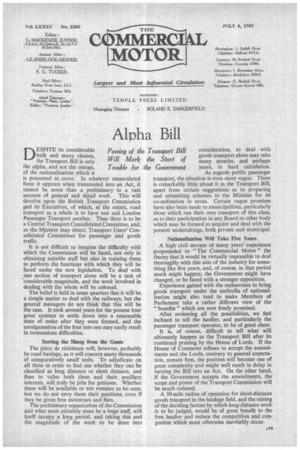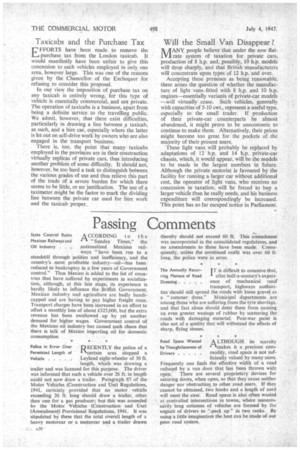Alpha Bill
Page 21

Page 22

If you've noticed an error in this article please click here to report it so we can fix it.
Passing of the Transport Bill Will Mark the Start of Trouble for the Government
DESPITE its considerable bulk and many clauses, the Transport Bill is only the alpha, and not the omega, of the nationalization which it is presumed to cover.' In whatever emasculated form it appears when transmuted into an Act, it cannot be more than a preliminary to a vast amount of general and detail work. This will devolve upon the British Transport Commission and its Executives, of which, at the outset, road transport as a whole is to have one and London Passenger Transport another. Then there is to be a Central Transport Consolidated Committee, and, as the Minister may direct, Transport Users' Consolidated Committees for passenger and goods traffic.
It is not difficult to imagine the difficulty with which the Commission will be faced, not only in obtaining suitable staff but also in training them to perform the functions with which they will be faced under the new, legislation. To deal with one section of transport alone will be a task of considerable magnitude, and the work involved in dealing with the whole will be colossal.
The belief is held in some quarters that it will be a simple matter to deal with the railways, but the general managers do not think that this will be the case. It took several years for the present four great systems to settle down into a reasonable state of order after they were formed, and the amalgamation of the four into one may easily result in tremendous difficulties.
Sorting the Sheep from the Goats The piece de resistance will, however, probably be road haulage, as it will concern many thousands of comparatively small units. To adjudicate on all these in order to find out whether they can be classified as long distance or short distance, and then to value both them and their ancillary interests, will truly be jobs for geniuses. Whether t,hese will be available or not remains to be seen, but we do not envy them their positions, even if they be given free motorcars and flats.
The preliminary organization of the Commission and what most certainly must be a huge staff, will itself occupy a long period, and taking thiS and the magnitude of the work to be done into consideration, to deal with goods transport alone may take many months, and perhaps years, in hard calculation.
As regards public passenger transport, the situation is even more vague. There is remarkably little about it in the Transport Bill, apart from certain suggestions, as to preparing and submitting schemes to the Minister for its co-ordination in areas. Certain vague promises have also been made to municipalities, particularly those which run their own transport of this class, as to their participation in any Board or other body which may be formed to acquire and deal with the present undertakings, both private and municipal.
Nationalization Will Take Five Years A high civil servant of many years' experience propounded to "The Commercial Motor" the theory that it would be virtually impossible to deal thoroughly with this side of the industry for something like five years, and, of course, in that period much might happen:. the Government might have changed, or be faced with a stronger opposition. Experience gained with the endeavours to bring goods transport under the umbrella of nationalization might also tend to make Members of Parliament take a rather different view of the " benefits " which are now freely promised.
After reviewing all the possibilities, we feel inclined to tell the haulier, and particularly the passenger transport operator, to be of good cheer. It is, of course, difficult to tell what will ultimately happen to the Transport Bill after its continued pruning by the House of Lords. If the House of Commons refuses to accept the amendments and the Lords, contrary to general expectation, remain firm, the position will become one of great complexity and might well result in delay in turning the Bill into an Act. On the other hand, if the Government accepts the amendments, the scope and power of the Transport Commission will be much reduced.
A 50-mile radius of operation for short-distance goods transport in the haulage field, and the raising of the deciding factors by which long-distance work is to be judged, would be of great benefit to the free haulier and reduce the competition and congestion which must otherwise inevitably occur.
Taxicabs and the Purchase Tax
FFORTS have been made to remove the purchase tax from the London taxicab. It would manifestly have been unfair to give this concession to such vehicles employed in only one area, however large. This was one of the reasons given by the Chancellor of the Exchequer for refusing to consider this proposal.
In our View the imposition of purchase tax on any taxicab is entirely wrong, for this type of vehicle is essentially commercial, and not private. The operation of taxicabs is a business, apart from being a definite service to the travelling public. We admit, however, that there exist difficulties, particularly in drawing a line between _a taxicab, as such, and a hire car, especially where the latter is let out on self-drive work by owners who are also engaged in the transport business.
There is, too, the point that many taxicabs employed in the provinces are in their construction virtually replicas of private cars, thus introducing another problem of some difficulty. It should not, however, be too hard a task to distinguish between the various grades of use and thus relieve this part of the trade of a severe burden for which there seems to be little, or no justification. The use of a taximeter might be the factor to mark the dividing line between the private car used for hire work and the taxicab proper.
Will the Small Van Disappear
/ANY people believe that under the new flatVI rate system of taxation for private cars, production of 8 h.p. and, possibly, 10 h.p. models will drop sharply, and that British manufacturers will concentrate upon types of 12 h.p. and over.
Accepting these premises as being reasonable, there arises the question of whether the manufacture of light vans fitted with 8 h.p. and 10 h.p. engines—essentially variants of private-car models —will virtually cease. Such vehicles, generally with capacities of 5-10 cwt., represent a useful type, especially to the small trader. If production of their private-car counterparts be almost abandoned, it might prove to be uneconomic to continue to make them. Alternatively, their prices might become too great for the pockets of the majority of their present users.
These light vans will probably be replaced by adaptations of 12 h.p. and 14 h.p. private-car chassis, which, it would appear, will be the models • to be made in the largest numbers in future. Although the private motorist is favoured by the facility for running a larger car without additional cost, the operator of light vans, who receives no concession in taxation, will be forced to buy, a larger vehicle than he really needs, and his business expenditure will correspondingly be increased. This point has so far escaped notice in Parliament.












































































